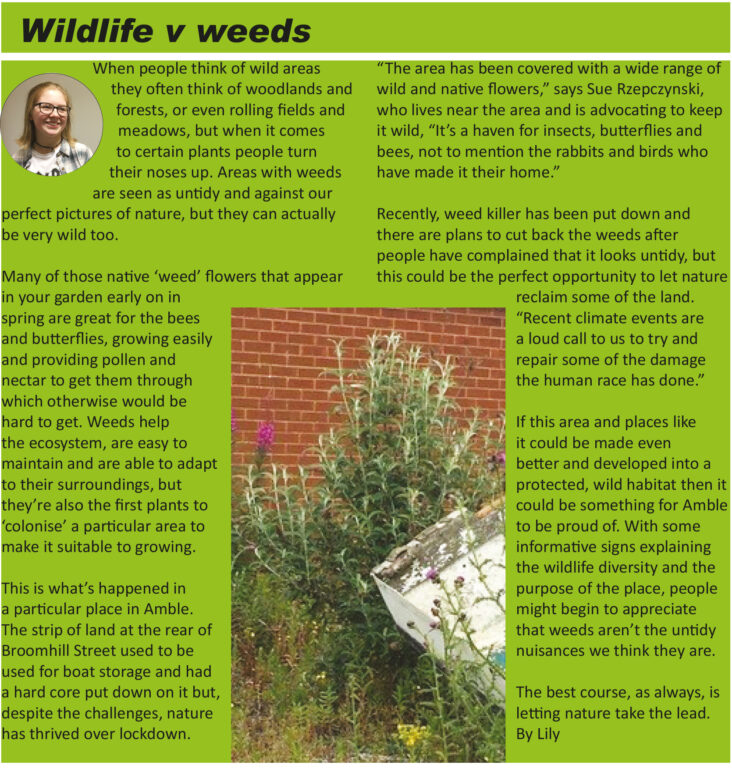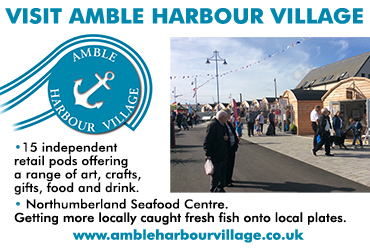What you say #137
Thoughts on developments in Amble
The recent adoption of the Northumberland Local Plan has significant implications for the development of Amble. Housing development outside the settlement area has become much harder whereas there is now a presumption in favour of applications within it.
Given climate change, the rationale is commendable. By building in towns, we can create more sustainable communities where people are less dependent on private transport.
But for Amble, there may also be negative consequences.
Despite our already overburdened infrastructure, the presumption in favour of such developments will apply irrespective of the number of houses already in the planning pipeline.
Furthermore, as development opportunities outside the settlement area diminish, developers are increasingly looking at developing more challenging and, arguably, more inappropriate sites, within it.
A good example is the proposal for a development at Braid Hill. This site is demanding on many levels. It largely lies in a Flood Zone 3 area, at high risk of flooding. Additionally, there are significant concerns around contamination – 399 tonnes of contaminated materials were removed during construction of the nearby Turner Street car park.
The proposed access road across The Braid is also controversial. An old unregulated rubbish tip, it was restored in the 1970s, using government monies, and has been used ever since for public recreation. There has been a huge outcry at the proposed loss of much-loved open space.
Compounding these issues is the cost of developing these difficult sites. Only two of the 59 supported living apartments will have wheelchair access and, of the whole development, less than 5% of the residences will be affordable. It is not the development many people would have chosen.
Change is inevitable. But as a community we need to be clear about what we want and not simply acquiesce to the profit drivers of commercial developers.
Jackie Turpin
via email
Ed: Readers may be interested to know that Northumberland Estates have withdrawn their application to build on Braid Hill. Planners recommended the application be refused. NE may resubmit a revised application in the future.
Sewage discharges are the reality of living in Amble
I would like to make a response to your editorial regarding the above topic [p8, Issue 136: Why is sewage discharged onto our beaches?]. (I note that the piece was signed by the editor and that the twitter post quoted by the piece also used the Ambler’s handle therefore presume that it was also written by the editorial team).
Some months ago, during a very heavy rainstorm, I was standing in my garden in Amble up to my ankles in untreated sewage effluent which had overflowed from the drainage system. I watched as the water rose toward the lip of my outside door knowing that if it reached that level my house would be flooded. When only an inch from the door the water suddenly stopped rising and started to flow back down the drains as though somebody had pulled out a giant plug. This is the moment that Northumbria Water opened the sluices to allow the overflow out into the river.
I also took it upon myself to warn local parents to stop their children playing in the floodwaters in their gardens and the local streets as this was not just rainwater. You can easily tell the difference because the overflow water is full of small pieces of shredded toilet paper. I tell this story to indicate that I believe that Northumbria Water’s attitude to these requirements is far from cavalier.
I too deplore the fact of sewage ending up on public beaches and in the sea but this is the reality of living in certain areas of Amble. We rely on the professional engineering staff at Northumbria Water to save our homes, gardens and streets from being flooded with sewage effluent and I would trust a professional engineer in the water industry rather than a member of the public who happened to be looking out of the window for half an hour to make the judgement as to when this is necessary. These extreme weather events are often very localised and it is often not easy to judge local rainfall from a relatively short distance away.
If you wish to identify who is to blame for this state of affairs I would suggest that instead of pointing the finger at local employees of Northumbria Water you turn your attention to the greedy, irresponsible politicians who sold off what was a public resource thereby committing them to having to pay dividends to shareholders rather than invest in the development of their infrastructure.
Robin Lewsey
via email
Ed: There was no intention of pointing at local employees of Northumbrian Water for the decision to allow sewage discharges into the River Coquet. Responsibility for the management of their company rests with the CEO and execs.
The Bord Waalk: A canny Geordie tale!
When the gusts of North Eastern rain belts down and
turns the grass to mud,
Your shoes get so wet you wished you could…
Go along the Bord Waalk down by the sea
Under a brolly you’ll find my lass and me
Then out of the rain and into the sun
Along the Bord Waalk we’ll be having some fun
From the distant car park you can almost smell the sea
And almost taste the fishy offerings they have promised me
That’s why the fish and bords are really the key
They’re part of our life and that’s the way it’ll always be.
Along the Bord Waalk down by the Sea
Now strolling along with the castle in view,
It’s just the wonderful place we always dreamt it would be.
Terry Barton via email
Dismayed by sculpture trail
As a relative newcomer to Amble, of eight years, I valued Amble for its relative unspoilt quality.
I was therefore dismayed to see concrete plinths being laid in formerly valued, by me, wild places and then later the sculptures. I am appreciative of sculpture in the right setting eg. a sculpture park, where people can choose to go and enjoy the art form.
I say keep wild places wild. Alas too late for Amble. I have to grit my teeth now if I need to walk in these polluted areas. I avoid them wherever possible. I wonder if these sculptures please the locals or the holiday makers, who surely come to experience the natural unspoilt beauty of a place.
“Blot on the landscape” comes to mind.
Lesley Burton
via email
Preserving our wild spaces

Wildlife v weeds
Last year the Ambler printed an article about wild spaces in Amble. This year it has again been pleasing to see the boat storage area behind Broomhill Street full of flowers and wildlife. We have been relieved to see that the Warkworth Harbour Commissioners have avoided using weed killers on it as they have been known to do in the past.
The last year has been overwhelming for us all. The war in Ukraine, the cost of living crisis and the ongoing impact of the pandemic on individuals and services has affected everyone. In many parts of the world, including the UK, weather extremes have caused death and destruction. It is hard to know as an individual or a community what we can do to help or change things for the better.
Areas like this one behind Broomhill Street, where nature has returned despite attempts to destroy it, are a symbol of hope and of more positive change. It is a sign that if we work with, instead of against nature, things can be improved.
Last year at the time of the UN Climate Change conference COP 26 in Glasgow, a group of us reached out to the Warkworth Harbour Commissioners who own this piece of land. We made detailed suggestions on how this area could be protected and developed as a wildlife haven alongside its role for boat storage. We were keen to involve the local community in a conversation about the area with them. Unfortunately, despite sending our ideas to the Commissioners we have still had no response at all from them and COP27 has now taken place.
It has been positive to see that the new Harbour Commissioners building has eco credentials. However, it is disappointing that they seem reluctant to discuss other environmental issues under their management with community stakeholders.
We are all beginning to understand the importance of small wildlife habitats in fighting climate change. Let’s hope that as a community we can be open and proactive in protecting and developing them for future generations.
Name supplied. Via email
Quayside walkway still closed
Almost fifteen months on now and it seems to have become a forgotten item, no remedial work or any other attempted repairs seem to have been undertaken, is it still on the agenda seeing as it was originally launched as part of the “Town trail” or just forgotten?
Alan Jamieson
via email
Ed: We do keep asking Northumberland County Council and Amble Marina what is happening with the repairs to the quayside walkway, but have been told that “discussions are continuing”. We will continue to ask.












